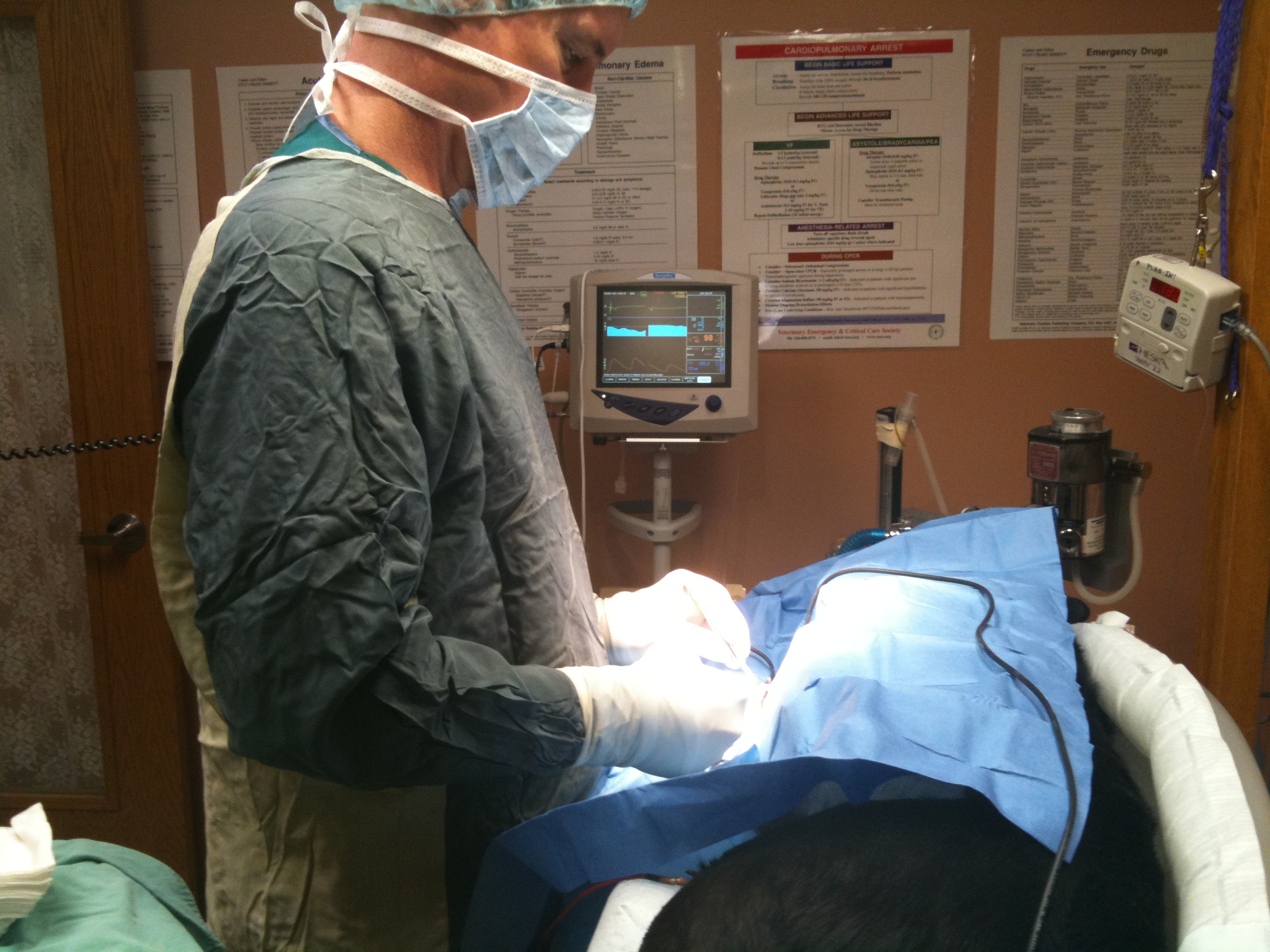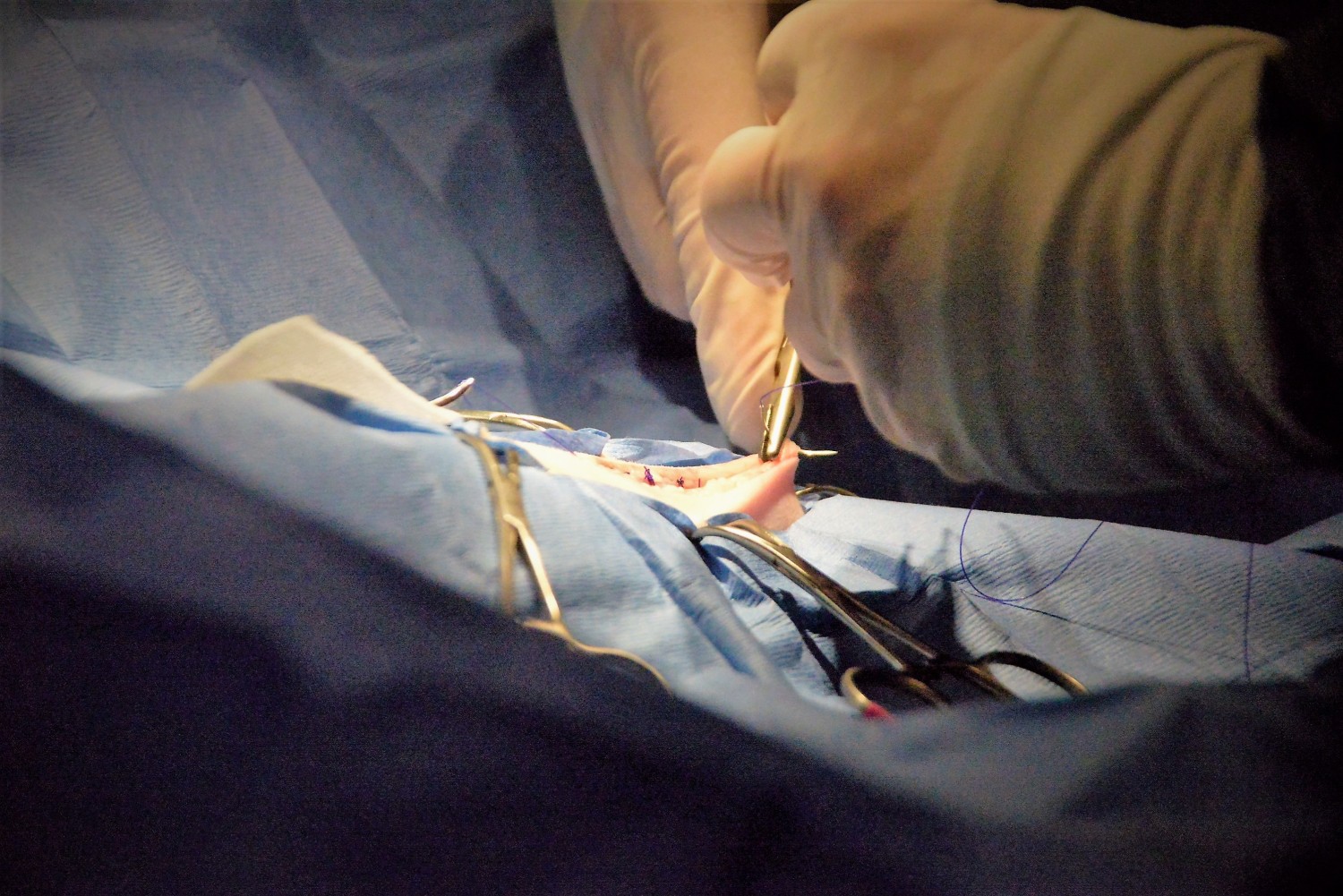|
Surgical Services
Veterinarians at the Animal Hospital of Chetek and Animal Hospital North are experienced in a wide variety of surgical procedures. While we routinely perform ovariohysterectomies (spay), and neuters, we are also capable of performing more complicated procedures. Our doctors have successfully removed damaged kidneys, and spleens, repaired injured intestines, removed bladder and urethral stones, repaired a variety of hernias, removed hundreds of tumors, and have performed many emergency life saving procedures.
Our doctors are also trained in orthopedic surgery, specifically cranial cruciate repairs. If your dog has a torn knee ligament our doctors can repair it. On the rare occasion that we encounter a surgery that we cannot perform (usually neurosurgery) we will refer your pet to the specialty hospital of your choice.

The reason we are able to perform such a wide variety of surgeries is our dedication to continuing education, and our investment in state of the art anesthetic and surgical equipment. When your pet needs surgery rest assured that at the Animal Hospital of Chetek and Animal Hospital North they will be receiving the best possible care.
What You Need to Know Before Your Pet's Upcoming Surgery
Many people have questions about various aspects of their pet's surgery. This page is dedicated to helping you with the decisions you will need to make before your pet's upcoming surgery.
Is the anesthesia safe?
 Today's modern anesthetic monitors have made surgery much safer than in the past. Here at Animal Hospital of Chetek and Animal Hospital North, we do a thorough physical exam on your pet before administering anesthetics, to ensure that a fever or other illness won't be a problem. We also adjust the amount and type of anesthetic used depending on the health of your pet. Today's modern anesthetic monitors have made surgery much safer than in the past. Here at Animal Hospital of Chetek and Animal Hospital North, we do a thorough physical exam on your pet before administering anesthetics, to ensure that a fever or other illness won't be a problem. We also adjust the amount and type of anesthetic used depending on the health of your pet.
Pre-anesthetic blood testing is important in reducing the risk of anesthesia. Every pet needs blood testing before surgery to ensure that the liver and kidneys can handle the anesthetic. Even apparently healthy animals can have serious organ system problems that cannot be detected without blood testing. If there is a problem, it is much better to find it before it causes anesthetic or surgical complications. Animals that have minor dysfunction will handle the anesthetic better if they receive IV fluids during surgery. If serious problems are detected, surgery can be postponed until the problem is corrected.
While many veterinarians offer minor preanesthetic screening, Our doctors prefer the fully comprehensive panels prior to surgery because it gives them the most information to ensure the safety of your pet. These tests are optional for healthy patients under 7 years old; however, we do require them for sick patients and those over 7 years of age. For geriatric or seriously ill pets, additional blood tests, electrocardiograms, or x-rays may be required before surgery as well.
Furthermore we pride ourselves on the certified veterinary technicians that monitor each and every surgery. A certified veterinary technician is a person who has gone through an additional 2-4 years of specialized education with the sole intention of assisting veterinarians. They are in every way the veterinary version of a registered nurse. Having these specially trained individuals monitor all our patients from the time anesthesia begins to the time the patient wakes up allows our doctors to focus solely on the surgery they are performing.
Finally it is important that surgery be done on an empty stomach to reduce the risk of vomiting during and after anesthesia. You will need to withhold food for at least 8 to 10 hours before surgery. Water can be left down for the pet until the morning of surgery.
Will my pet have stitches?
For many surgeries, we use absorbable sutures underneath the skin. These will dissolve on their own, and do not need to be removed later. Some surgeries, especially tumor removals, do require skin stitches. With either type of suture, you will need to keep an eye on the incision for swelling or discharge. Most dogs and cats do not lick excessively or chew at the incision, but this is an occasional problem you will also need to watch for. If there are skin sutures, these will usually be removed 10 to 14 days after surgery. You will also need to limit your pet's activity level for a time and no baths are allowed for the first 10 days after surgery.

Will my pet be in pain?
Anything that causes pain in people can be expected to cause pain in animals. Pets may not show the same symptoms of pain as people do; they usually don't whine or cry, but you can be sure they feel it. Pain medications needed will depend on the surgery performed. Major procedures require more pain relief than things like minor lacerations.
For dogs, we typically prescribe an oral anti-inflammatory the day after surgery and several days after to lessen the risk of discomfort and swelling. We use newer medications, which are less likely to cause stomach upset and can be given even the morning of surgery. Immediately following surgery, injectable pain medication is given on a case by case basis. Any animal that appears painful will receive additional pain medication.
We use time released pain medication patches for some surgeries in dogs as well. Providing whatever pain relief is appropriate is a humane and caring thing to do for your pet. At the Animal Hospital of Chetek and Animal Hospital North pain medication is NEVER optional, it is always mandatory. We consider it cruel to perform even a spay or a neuter without providing pain relief before, during, and after the procedure.
What other decisions do I need to make?
While your pet is under anesthesia, it is the ideal time to perform other minor procedures, such as dentistry, ear cleaning, or implanting an identification microchip. If you would like an estimate for these extra services, please call ahead of time. This is especially important if the person dropping the pet off for surgery is not the primary decision maker for the pet's care.
When you bring your pet in for surgery, we will need to 5 to 10 minutes of time to fill out paperwork and make decisions on the blood testing and other options available. When you pick up your pet after surgery you can also plan to spend about 10 minutes to go over your pet's home care needs.
We will call you the night before your scheduled surgery appointment, to confirm the time you will be dropping your pet off and to answer any questions you might have. In the meantime, please don't hesitate to call us with any questions about your pet's health or surgery.
|
